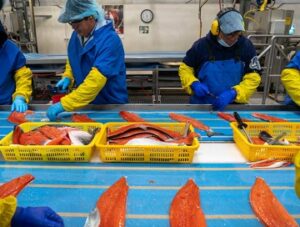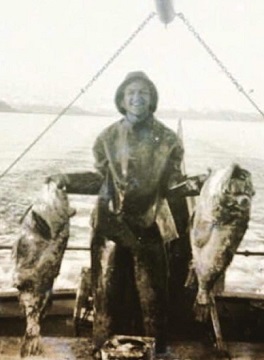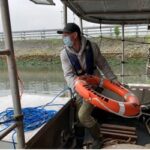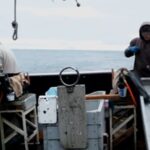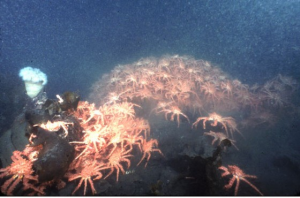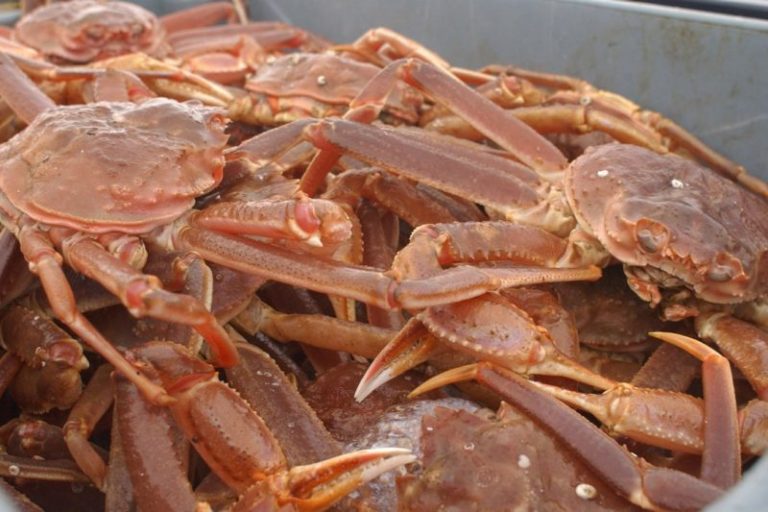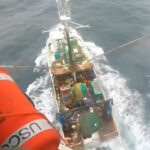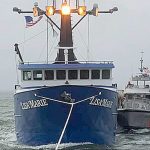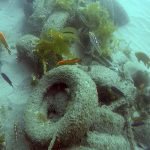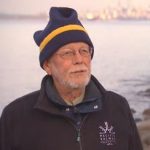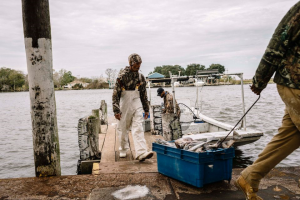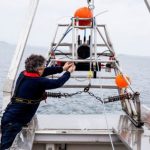Tag Archives: Alaska
Alaska Gov. Dunleavy names ad consultant, talk show host Porcaro to commercial fisheries agency
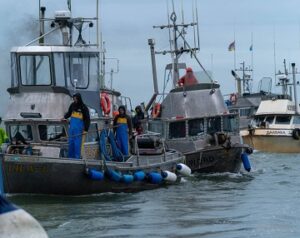 Alaska Republican Gov. Mike Dunleavy has appointed a GOP advertising consultant and talk show host to a highly paid state government job: a position overseeing commercial fishing permits. Dunleavy this month appointed Mike Porcaro as one of two commissioners overseeing the Commercial Fisheries Entry Commission, or CFEC — an obscure, Juneau-based agency with some 20 employees. The commission issues annual commercial fishing permits, grants and denies permit transfers in the event of illnesses and deaths and publishes fisheries reports and statistics. “All I’m doing is trying to answer a call of service, and I’m going to do the best job I can do,” Porcaro said in an interview Thursday. He added: “Judge me on my performance.”>click to read< 11:33
Alaska Republican Gov. Mike Dunleavy has appointed a GOP advertising consultant and talk show host to a highly paid state government job: a position overseeing commercial fishing permits. Dunleavy this month appointed Mike Porcaro as one of two commissioners overseeing the Commercial Fisheries Entry Commission, or CFEC — an obscure, Juneau-based agency with some 20 employees. The commission issues annual commercial fishing permits, grants and denies permit transfers in the event of illnesses and deaths and publishes fisheries reports and statistics. “All I’m doing is trying to answer a call of service, and I’m going to do the best job I can do,” Porcaro said in an interview Thursday. He added: “Judge me on my performance.”>click to read< 11:33
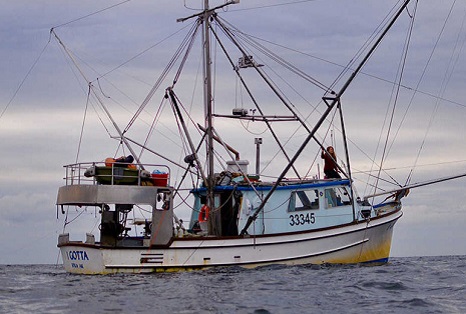
Battery-Electric Fishing Vessel Marks a Sea Change for Small Commercial Fishers
On a brisk morning this fall, a 46-foot commercial fishing boat will cruise into the cold waters of Sitka, Alaska, and cut the diesel engine. In that moment of near silence, an electric motor will whir to life. This moment will mark a sea change for Sitka’s small-boat commercial fishing industry: a transition to energy-efficient commercial fishing, powered by low- and zero-emissions propulsion systems. The boat in question, a small commercial salmon troller named I Gotta, will make history as one of the first low-emissions fishing vessels ever deployed in Alaska. Using a unique parallel hybrid battery-diesel system, the boat can travel at full speed using its diesel engine, then switch to a battery-electric motor when fishing. In this way, I Gotta’s captain, Eric Jordan, will be able to cut the boat’s fuel use by 80%. >click to read<
Crew member on factory trawler dies after possible ammonia exposure onboard
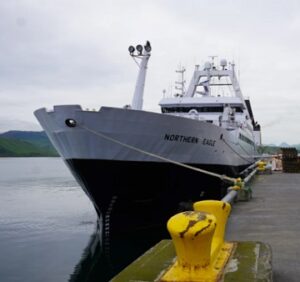 A crew member on an American Seafoods factory trawler died at sea last week, likely from an ammonia leak on board. U.S. Coast Guard Petty Officer Second Class John Highwater said they received a satellite call from the Northern Eagle at about 4:30 a.m. Friday. “One of their crew members was found unresponsive in one of their engineering spaces,” Highwater said. “They believe there was an ammonia leak somewhere in the vessel that caused the person to fall unconscious.” The nearly 350-foot vessel was already en route to Unalaska/Dutch Harbor when they made the call to the Coast Guard. >click to read< 08:49
A crew member on an American Seafoods factory trawler died at sea last week, likely from an ammonia leak on board. U.S. Coast Guard Petty Officer Second Class John Highwater said they received a satellite call from the Northern Eagle at about 4:30 a.m. Friday. “One of their crew members was found unresponsive in one of their engineering spaces,” Highwater said. “They believe there was an ammonia leak somewhere in the vessel that caused the person to fall unconscious.” The nearly 350-foot vessel was already en route to Unalaska/Dutch Harbor when they made the call to the Coast Guard. >click to read< 08:49
New quota system to start for trawl harvests of cod in Bering Sea and Aleutians
 Commercial fishermen netting Pacific cod from the Bering Sea and Aleutians region will be working under new individual limits starting next year designed to ease pressure on harvests that regulators concluded were too rushed, too dangerous and too prone to accidentally catch untargeted fish species. The new system will require fishers who harvest cod by trawl – the net gear that scoops up fish swimming near the bottom of the ocean – to be part of designated cooperatives that will then have assigned quota shares. The fisheries service at the National Oceanic and Atmospheric Administration said it has notified eligible participants and is asking for applications. >click to read< 08:54
Commercial fishermen netting Pacific cod from the Bering Sea and Aleutians region will be working under new individual limits starting next year designed to ease pressure on harvests that regulators concluded were too rushed, too dangerous and too prone to accidentally catch untargeted fish species. The new system will require fishers who harvest cod by trawl – the net gear that scoops up fish swimming near the bottom of the ocean – to be part of designated cooperatives that will then have assigned quota shares. The fisheries service at the National Oceanic and Atmospheric Administration said it has notified eligible participants and is asking for applications. >click to read< 08:54
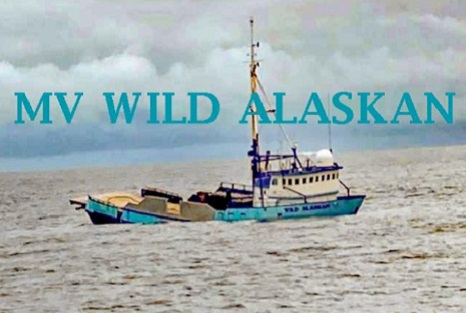
Sinking of the Wild Alaskan – Document Dump #35
It is almost comical to think that the Kodiak Daily Mirror suppressed this story for over 4 months when my lawsuit was originally filed and now that a Federal Judge has dismissed portions of my lawsuit against Federal Agents with prejudice; the Kodiak Daily Mirror which has now proven themselves to be an ankle biting lap dog of the City and the Feds rushes to print this story in yet another front-page, one-sided news article. The Kodiak Daily Mirror also wrote in the article, “Neither Byler nor U.S. Attorney Glenn James Shidner was available for comment at press time Monday.” This statement to all of our local readers in Kodiak was 100% total B.S. I was never contacted by phone, email, text message, nor on my Facebook page that now has more readers than the Kodiak Daily Mirror. Can any of you that have been following this story possibly imagine that I would not have a comment on this issue. I am going to have to give this flat out, false statement, 4 Pinocchio’s and the Publisher Kevin Bumgarner has just earned himself another photo with his clown hat at the ‘Sinking of the Wild Alaskan’ Facebook page. >click to read< 13:48
Nine harvesters cited for dumping commercially caught chum salmon
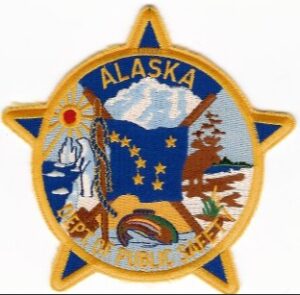 In a special enforcement operation designed to protect Alaska’s fisheries resource, state wildlife troopers have issued 21 citations after over 100 vessel boardings in the Area M fishery, including nine citations for illegal discard of commercially caught salmon. Each of the individuals cited must appear before a judge, said Austin McDaniel, communications director for the Alaska Department of Public Safety. Each one was given a mandatory court date, but meanwhile is allowed to continue fishing, he said. The citations are all misdemeanors, with a maximum punishment of a $15,000 fine and one year in jail. Area M Seiners Association, which represents Area M seine and set gillnet permit holders, issued a statement saying that the association takes this issue very seriously and has a zero-tolerance policy for malicious behavior. >click to read< 09:56
In a special enforcement operation designed to protect Alaska’s fisheries resource, state wildlife troopers have issued 21 citations after over 100 vessel boardings in the Area M fishery, including nine citations for illegal discard of commercially caught salmon. Each of the individuals cited must appear before a judge, said Austin McDaniel, communications director for the Alaska Department of Public Safety. Each one was given a mandatory court date, but meanwhile is allowed to continue fishing, he said. The citations are all misdemeanors, with a maximum punishment of a $15,000 fine and one year in jail. Area M Seiners Association, which represents Area M seine and set gillnet permit holders, issued a statement saying that the association takes this issue very seriously and has a zero-tolerance policy for malicious behavior. >click to read< 09:56
State opens commercial fishing on the Kuskokwim River to one person
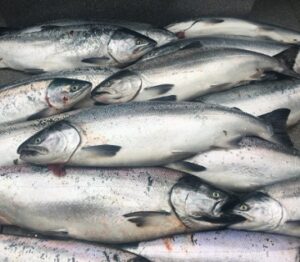 Coming just days after the U.S. Fish and Wildlife Service returned management of the Kuskokwim River to the Alaska Department of Fish and Game, the state has announced eight separate commercial openers in August. These opportunities are only available to individuals registered as catcher/sellers. On the Kuskokwim, there is only one of these and his name is Fran Reich. “I’ve been a commercial fisherman for almost 50 years on the river,” Reich said. Reich has been the sole catcher/seller on the river for around a decade. He said that he’s retired, but that fishing is just in his blood. He runs a small company called FAR West Fish & Farm out of his home in Bethel. >click to read< 13:50
Coming just days after the U.S. Fish and Wildlife Service returned management of the Kuskokwim River to the Alaska Department of Fish and Game, the state has announced eight separate commercial openers in August. These opportunities are only available to individuals registered as catcher/sellers. On the Kuskokwim, there is only one of these and his name is Fran Reich. “I’ve been a commercial fisherman for almost 50 years on the river,” Reich said. Reich has been the sole catcher/seller on the river for around a decade. He said that he’s retired, but that fishing is just in his blood. He runs a small company called FAR West Fish & Farm out of his home in Bethel. >click to read< 13:50
NOAA Recommends $106.1 Million in funding for West Coast and Alaska salmon recovery
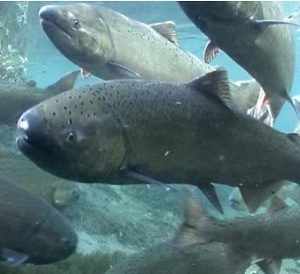 Today, the Department of Commerce and NOAA announced more than $106 million in recommended funding for 16 West Coast and Alaska state and tribal salmon recovery programs and projects under the Pacific Coastal Salmon Recovery Fund (PCSRF). The funds, including $34.4 million under the Bipartisan Infrastructure Law and $7.5 million under the Inflation Reduction Act, will support the recovery, conservation and resilience of Pacific salmon and steelhead in Alaska, California, Idaho, Oregon and Washington. This funding is part of President Biden’s historic Investing in America agenda, which includes over $2 billion for fish passage investments across the country. >click to read< 18:03
Today, the Department of Commerce and NOAA announced more than $106 million in recommended funding for 16 West Coast and Alaska state and tribal salmon recovery programs and projects under the Pacific Coastal Salmon Recovery Fund (PCSRF). The funds, including $34.4 million under the Bipartisan Infrastructure Law and $7.5 million under the Inflation Reduction Act, will support the recovery, conservation and resilience of Pacific salmon and steelhead in Alaska, California, Idaho, Oregon and Washington. This funding is part of President Biden’s historic Investing in America agenda, which includes over $2 billion for fish passage investments across the country. >click to read< 18:03

PWS Seine fleet reacts to low prices
Halfway through the Prince William Sound seine season, captains and crew are reacting to a dramatic drop in pink and chum salmon prices. The price updates came in the form of official letters and informal text messages from various processors this week. Grounds price for pink salmon hovers at $.23/lb with chum salmon prices following at $.20/lb. Rumors of chum price dipping below $.20/lb were also reported by fishermen. The seine fleet has seen a season patterned by frequent closures this year. Jamel Lister is a seasonal deckhand who has returned to work in the fishery for his seventeenth year, this season aboard the F/V Gorbushka. Lister said although he does pay attention to salmon markets leading up to the season, a poor forecast or low price does not deter him from returning each summer. >click to read< 12:25
Trooper citations for salmon discards add grist to regional Alaska fishery dispute
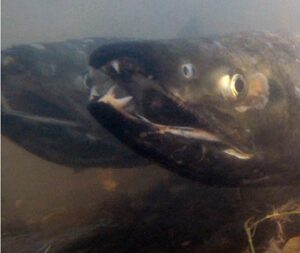 For years, residents along the Yukon and Kuskokwim rivers have accused fishers operating in marine waters north of the Alaska Peninsula of intercepting too many river-bound salmon, sometimes in hidden ways. Now a trooper enforcement campaign by the Alaska State Troopers wildlife division gives some credence to those accusations. The campaign, carried out in June and July in the region known as Area M, resulted in nine citations issued to captains and crew members for allegedly dumping unwanted salmon overboard, the Alaska State Troopers said in a statement issued Thursday. >click to read< 09:43
For years, residents along the Yukon and Kuskokwim rivers have accused fishers operating in marine waters north of the Alaska Peninsula of intercepting too many river-bound salmon, sometimes in hidden ways. Now a trooper enforcement campaign by the Alaska State Troopers wildlife division gives some credence to those accusations. The campaign, carried out in June and July in the region known as Area M, resulted in nine citations issued to captains and crew members for allegedly dumping unwanted salmon overboard, the Alaska State Troopers said in a statement issued Thursday. >click to read< 09:43
Bristol Bay fleets call for greater price transparency
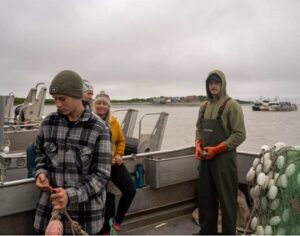 There’s a multi-decade precedent for Bristol Bay salmon processors to wait until the season is underway to announce what they’re willing to pay. Peter Pan shook up the industry in 2021 and 2022 by announcing a base price at the start of the season, but this year waited until mid-July, along with other processors in the region. Captain Konrad Schaad, of the Fishing Vessel Skua, says this model hurts fishers. “The producer gets paid what’s left over. We produce the fish and then it gets processed and sold and everything and everybody gets their cut, and then the morsels that are leftover, they give to us. There should be a fixed cost for what we produce here,” he said. In Bristol Bay, commercial fishing crews fish on what’s called an ‘open ticket. >click to read< 12:53
There’s a multi-decade precedent for Bristol Bay salmon processors to wait until the season is underway to announce what they’re willing to pay. Peter Pan shook up the industry in 2021 and 2022 by announcing a base price at the start of the season, but this year waited until mid-July, along with other processors in the region. Captain Konrad Schaad, of the Fishing Vessel Skua, says this model hurts fishers. “The producer gets paid what’s left over. We produce the fish and then it gets processed and sold and everything and everybody gets their cut, and then the morsels that are leftover, they give to us. There should be a fixed cost for what we produce here,” he said. In Bristol Bay, commercial fishing crews fish on what’s called an ‘open ticket. >click to read< 12:53
Bristol Bay drift permits drop in value
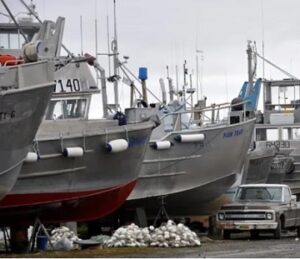 Just a few months ago, a permit for driftnet salmon in Bristol Bay went for over $225,000. There were many in that general price range late last fall. This month, the prices at permit brokerages show that some are being offered for as little as $140,000, more than a one-third drop in value. The price for commercial fishing permits goes up and down through time. In 2020, Bristol Bay drift permits could be found for between $170,000 and $180,000. Then they went up, and now they are down. >click to read< 19:43
Just a few months ago, a permit for driftnet salmon in Bristol Bay went for over $225,000. There were many in that general price range late last fall. This month, the prices at permit brokerages show that some are being offered for as little as $140,000, more than a one-third drop in value. The price for commercial fishing permits goes up and down through time. In 2020, Bristol Bay drift permits could be found for between $170,000 and $180,000. Then they went up, and now they are down. >click to read< 19:43
Trident’s new processing plant in Unalaska will be the largest in North America
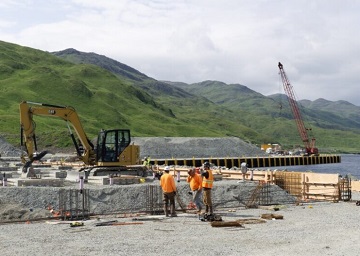 Trident Seafoods has begun building the first bunkhouses at its to-be processing plant in Unalaska’s Captains Bay, progressing on a timeline the seafood titan says would make it operational by 2027. The Aleutian Islands and Bering Sea region is home to some of the world’s most productive fishing grounds. It’s where most Alaska pollock comes from, the whitefish found in fish sticks and McDonald’s Filet-O-Fish sandwiches worldwide. And a lot of that fish is processed at the giant Trident Seafoods plant in Akutan. But aging infrastructure and decades of wear prompted the seafood company to plan a new facility. >click to read< 10:35
Trident Seafoods has begun building the first bunkhouses at its to-be processing plant in Unalaska’s Captains Bay, progressing on a timeline the seafood titan says would make it operational by 2027. The Aleutian Islands and Bering Sea region is home to some of the world’s most productive fishing grounds. It’s where most Alaska pollock comes from, the whitefish found in fish sticks and McDonald’s Filet-O-Fish sandwiches worldwide. And a lot of that fish is processed at the giant Trident Seafoods plant in Akutan. But aging infrastructure and decades of wear prompted the seafood company to plan a new facility. >click to read< 10:35
Coast Guard rescues man from commercial fishing vessel taking on water in Juneau, Alaska
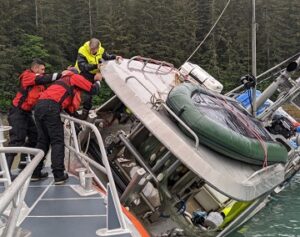 The Coast Guard rescued a mariner Tuesday morning after his vessel began taking on water in the Gastineau Channel. A 45-foot Response Boat-Medium crew from Coast Guard Station Juneau safely evacuated the survivor at 6:33 a.m. and transported him in stable condition to Harris Harbor. Watchstanders at the Coast Guard Sector Southeast Alaska command center received notification via channel 16 at 6:08 a.m. that the 40-foot commercial fishing vessel F/V Marco was taking on water with one person aboard. >click to read< 16:12
The Coast Guard rescued a mariner Tuesday morning after his vessel began taking on water in the Gastineau Channel. A 45-foot Response Boat-Medium crew from Coast Guard Station Juneau safely evacuated the survivor at 6:33 a.m. and transported him in stable condition to Harris Harbor. Watchstanders at the Coast Guard Sector Southeast Alaska command center received notification via channel 16 at 6:08 a.m. that the 40-foot commercial fishing vessel F/V Marco was taking on water with one person aboard. >click to read< 16:12
Bristol Bay Sees Strong Wild Sockeye Harvest to Follow Up Record-Breaking Year
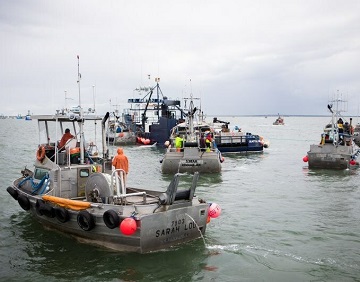 The cumulative wild sockeye salmon harvest through the end of July in Bristol Bay, Alaska, currently sits at 38 million fish, surpassing the forecast of 37 million fish. As anticipated, this season’s strong returns make 2023 one of the top five harvest seasons of the past 20 years – quite a follow-up to last year’s all-time record-breaking harvest. Bristol Bay is known as “America’s Wild Sockeye Source,” and is home to the largest wild salmon run on the planet, producing half the world’s supply of wild sockeye. “The strong harvests out of Bristol Bay in recent years are a testament to the responsible fisheries management of Alaska and the Bristol Bay fishing industry including fishermen, biologists, local community and seafood processors, and speak to the health and thriving future of the wild sockeye in the region,” >click to read< 13:08
The cumulative wild sockeye salmon harvest through the end of July in Bristol Bay, Alaska, currently sits at 38 million fish, surpassing the forecast of 37 million fish. As anticipated, this season’s strong returns make 2023 one of the top five harvest seasons of the past 20 years – quite a follow-up to last year’s all-time record-breaking harvest. Bristol Bay is known as “America’s Wild Sockeye Source,” and is home to the largest wild salmon run on the planet, producing half the world’s supply of wild sockeye. “The strong harvests out of Bristol Bay in recent years are a testament to the responsible fisheries management of Alaska and the Bristol Bay fishing industry including fishermen, biologists, local community and seafood processors, and speak to the health and thriving future of the wild sockeye in the region,” >click to read< 13:08
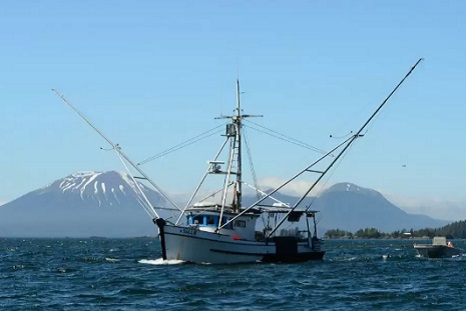
Fish plentiful, but fishermen scarce for Southeast Alaska’s first summer king opening
The numbers are in for the first opening in the summer troll fishery for king salmon in Southeast Alaska. The 12-day season saw more chinook landed than expected, despite fewer boats being on the water. Southeast trollers brought in about 85,000 king salmon from July 1 to July 12, around 8,000 fish over the target for the first opener of the season. At first, it might look like enthusiasm played a role, as it was only on June 21 that the US Ninth Circuit Court of Appeals issued a stay that allowed the fishery to occur at all. But that was not the case. Grant Hagerman manages the troll fishery for the Alaska Department of Fish and Game. He says even fewer trollers participated this summer than in 2022. >click to read< 10:37
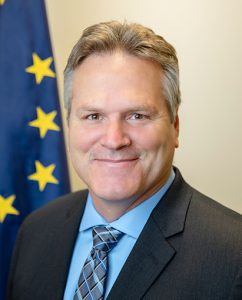
Alaska leaders petition the US Supreme Court for reversal of EPA ban on Pebble Mine
The Dunleavy administration on Wednesday asked the U.S. Supreme Court to overturn the Environmental Protection Agency’s decision to block the controversial Pebble copper and gold mine. Gov. Mike Dunleavy, in the statement, echoed arguments made in the brief assert the EPA action effectively confiscates state property and clashes with the Alaska constitution’s mandates. “Our constitution is clear: Alaska is responsible for utilizing, developing, and conserving all of the State’s natural resources for the maximum benefit of its people,” Dunleavy said in the statement. “Bureaucrats in Washington D.C. are exercising unbridled and unlawful power to choke off any further discussion on this important decision affecting so many Alaskans.” >click to read< 18:09
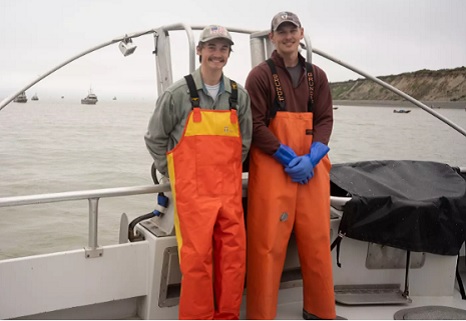
Young fishing crews question future of fishery
Wesley Blough and Jordan Manor are childhood friends, growing up crewing on their fathers’ boats in Bristol Bay. Now in their mid twenties, they live in Hoonah, Alaska and Bainbridge Island, Washington respectively but they return each season to deckhand. For the young fishermen, it’s like a family reunion. “Jordan and I have known each other now for nine years. And this is the only time we see each other,” Blough said, “Four weeks into the fishing season, processors posted a record-low base price of 50 cents per pound – less than half of last year’s price – igniting outrage and frustration among crews across the fishery. Jordan and Wesley’s fathers Darren Manor and Cheyne Blough helped organize the protest in the Naknek River on July 20, where over one hundred boats anchored up in a demonstration, calling on processors to increase the base price and transparency in the fishery. >click to read< 07:55
Photos: On the water with Bristol Bay’s protesting fishing crews
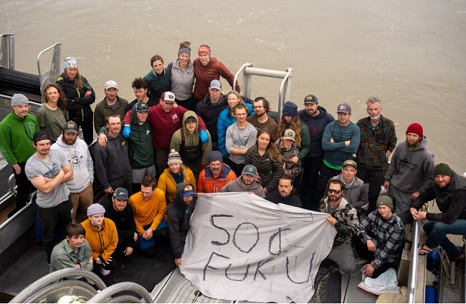 Commercial fishing crews joined together at the mouth of the Naknek River to peacefully protest the low price that processors are offering for this year’s sockeye salmon. They want processors to reconsider the 50 cents per-pound price, as well as more transparency in the fishery. The protest began at 6:00 AM on Thursday, July 20, and lasted through the day. >click to see the photos< 11:33
Commercial fishing crews joined together at the mouth of the Naknek River to peacefully protest the low price that processors are offering for this year’s sockeye salmon. They want processors to reconsider the 50 cents per-pound price, as well as more transparency in the fishery. The protest began at 6:00 AM on Thursday, July 20, and lasted through the day. >click to see the photos< 11:33
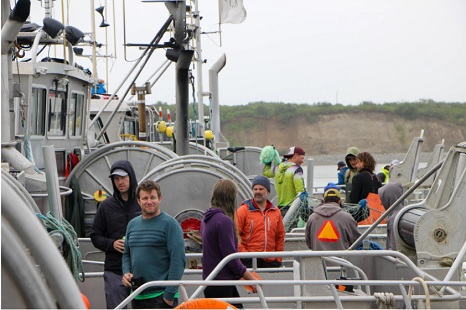
Bristol Bay fishermen protest low base price, lack of transparency
By 9 am, over one hundred boats are anchored in the Naknek River entrance, some after a night of fishing the Naknek-Kvichak. Ivan Basargin of the fishing vessel Top Notch is one of them. He’s here to join the demonstration against this year’s low price. Standing in the wheelhouse of a boat he built, he says this year’s low-price hits hard. “I’m going to pay my workers. I’m going to pay my bills. As far as living expenses, I haven’t decided yet. This 50 cents that I get, when I get home, it’s going to be a wash. I’m not going to have any money in the bank saved,” he said. Organizers of the protest are calling on processors to reconsider and improve the base price this season from 50 cents per pound, less than half of last year’s price. “If they know we can fish for 50 cents, we’re going to get paid 30 cents next year,” he said. “That will happen if we don’t do anything. Like today – this is a peaceful protest. We’re not trying to block people or anything. We’re just trying to show the world that we’re hurting, and we need some help.” Basargin says processors are claiming they are struggling financially too but he hasn’t seen evidence of this struggle. >click to read< 17:15
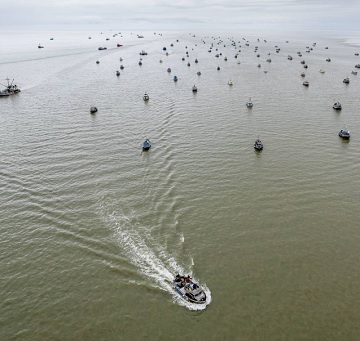
Alaska salmon fishermen fume over low prices, but processors say they’re hurting too
Aboard the F/V Five Star, his boat, Danielson and his deckhand put away as many pounds of fish as they could. They had no breakdowns. But his seafood processor is paying him 70 cents per pound for his salmon, half of last year’s price which means that instead of his usual six-figure haul for a summer of hard work, he might only break even, or go home to his family in Washington with $10,000, if he’s lucky. He added: “We’re up against something that’s out of our control, and that’s the processors killing us here.” In the past few weeks, thousands of fishermen across the state have found themselves in a similar predicament,,, Photos, >click to read< 08:52
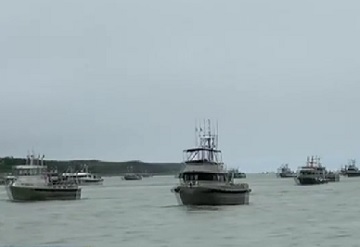
Bristol Bay fishermen protest processors’ low sockeye market price — 50 cents per pound
Some Bristol Bay fishermen are furious over the 50 cent per pound market price for sockeye salmon that Bristol Bay processors are hitting them with. Now the fishermen are protesting over a market price they received 40 years ago — a price some fisherman said could force the industry into a downward spiral, and that action needs to be taken. On Thursday morning more than 60 fishing vessels lined the Naknek River in solidarity. Protest spokesperson Cheyne Blough said the protest was announced on Facebook when the processors declared the base price earlier this week. Blough said the 50 cent per pound market price isn’t enough for fishermen to recover their costs, and could put some out of business. Video, >click to read< 07:45
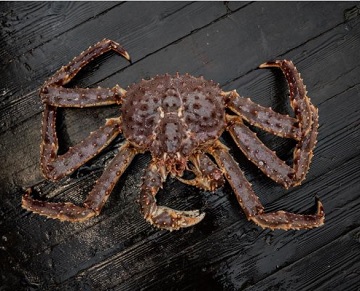
Western Alaska: Crab are looking healthy after downturn in 2019
The region is known for its abundant crab populations and supports several species. Ten species of crab are caught throughout fisheries in the state, seven of them having commercial importance. According to the Alaska Fish and Game (ADF&G) website, the Bering Sea, Aleutian Islands, and the Gulf of Alaska combined produce approximately 1/3 or more of total crab catches in the United States. The season for commercial crabbing is dependent on when they open, and how fast the guideline harvest limit (GHL) is caught. The harvest data from this season and the trawl survey are put into the model. >click to read< 12:57
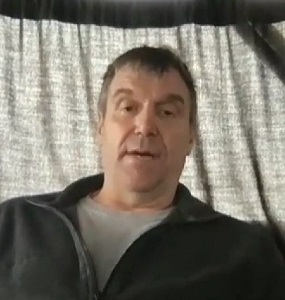
Bristol Bay fishermen up in arms against lower salmon prices, will protest
Commercial fishermen in the Bristol Bay region are voicing their displeasure against recent prices of sockeye salmon. According to fisherman Cheyne Blough, the price of sockeye salmon hovered around $1.20-$1.50 per pound, but as of recently, the price dropped to 50 cents. “We all expected less than last year. But we had no clue it was gonna be basically kind of bankruptcy prices,” Blough said. Since then, Blough along with several other commercial fishermen have set up a protest that will happen on Thursday, where fishermen will line up their boats in front of the Naknek River, in protest of the lowered prices. Video, >click to read< 07:50
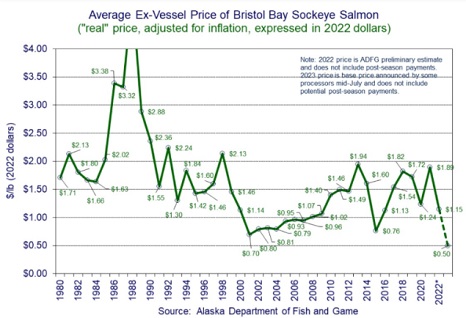
Bristol Bay bust – Bristol Bay salmon prices hit rock bottom
Prices paid commercial fishermen for their catches of wild, Bristol Bay sockeye salmon have just set a modern record low of 50 cents per pound. That’s only three cents per pound less than the average price paid for a Southeast Alaska pink salmon – or humpy as Alaskans usually call the smallest and blandest tasting of the Pacific – in 2018, according to Alaska Department of Fish and Game data. With a correction for inflation, that old humpy would now be worth 8 cents more per pound than a Bristol Bay sockeye. The last time the Bay saw anything like this was more than two decades ago when the sockeye price hit 42 cents per pound. Once inflation adjusted, however, those fish had a value of 70 cents per pound – 20 cents more than what Trident Seafoods and other processors are now offering. >click to read< 07:53
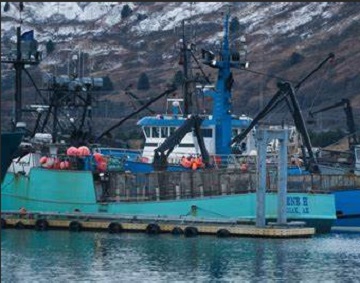
Big back-to-back years renew talks of Kodiak Tanner crab protections
The last two years have been big for Kodiak Tanner crab fishermen. Processors offered a record of more than $8 per pound back in 2022. And this year’s harvest levels were the highest they’ve been since 1986, making it the largest crab fishery in the state. But all that attention has also renewed discussions about how to best manage – and protect – the fishery going forward. Back in January, boats sat on anchor waiting to offload their huge crab harvests at Kodiak processors – sometimes for a week or more. Kodiak’s Tanner crab population tends to fluctuate. But when numbers are good, the season opens in mid-January. More than 130 vessels participated in this year’s fishery. Peterson said it’s welcome work for skippers and crew. >click to read< 08:02
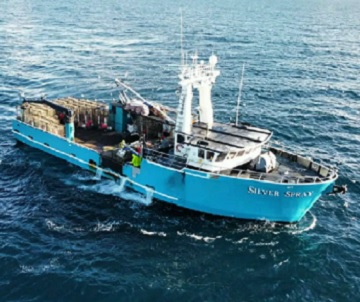
Crab season closures ‘devastating’ for Bering Sea fishing family
For Kodiak’s Gabriel Prout, crab fishing is both an occupation and a way of life. “There’s something special about being on the water and being a Bering Sea crab fisherman,” said Prout, whose father spent 45 years fishing on the Bering Sea. “It’s kind of hard to explain. There is a deep appreciation for what we do and the resource and the job and the work we put in.” In the summer of 2020, Prout and his brothers purchased a boat and took out loans to buy fishing rights. But in the fall of 2022, his family was hit with multiple setbacks. Not only had the Alaska Department of Fish and Game canceled the Bristol Bay red king crab season for the second year in a row, the Bering Sea snow crab season was also canceled. Video, >click to read< 14:04
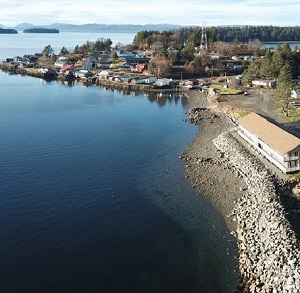
The Alaskan Mass Murder Thats Remained Unsolved For More Than 30 Years
In 1982, the F/V Investor, a commercial fishing boat, was set ablaze on an island near Craig, a remote fishing village in Southeast Alaska. The charred remains of eight people were later found onboard: The boat’s owner, Mark Coulthurst, his pregnant wife, Irene, their two young children, and four deckhands; all shot and killed before the boat was burned. By 1984, John Kenneth Peel, a boatyard worker, was arrested for the crime, but later acquitted. Speaking with People in 2017, David McNeill, a former Washington state police detective involved in the investigation, said this is less an indication of innocence than a prosecutorial failure to present sufficient evidence against Peel. >click to read< 09:10






